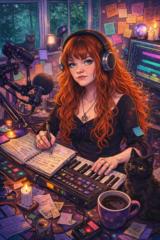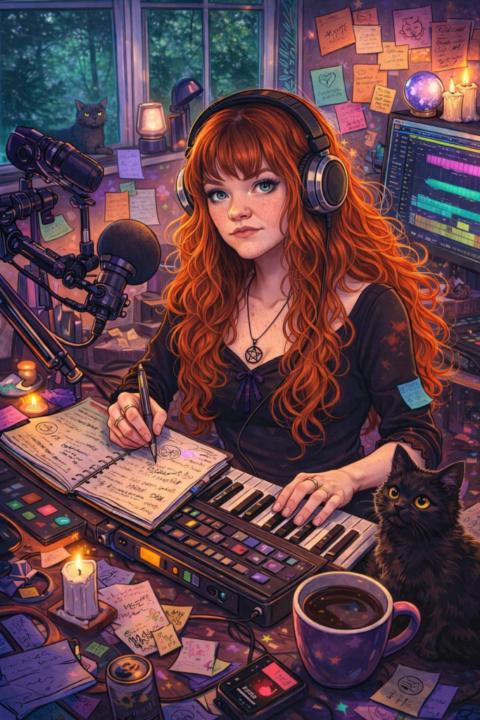Activity
Mon
Wed
Fri
Sun
Mar
Apr
May
Jun
Jul
Aug
Sep
Oct
Nov
Dec
Jan
Feb
What is this?
Less
More
Memberships
Hit Record Academy
280 members • Free
The Sync Alliance
157 members • $55/month
SyncRadar
340 members • Free
Paint the Noise (PTN) Pulse
103 members • Free
4 contributions to Paint the Noise (PTN) Pulse
Share you favorite movie score that inspires you!
I love the Star Wars theme. It has always brought a since of inpsiration,awe,exploration of creativity to me since i was a kid. https://www.youtube.com/watch?v=_D0ZQPqeJkk&list=RD_D0ZQPqeJkk&start_radio=1
The World of A.I. in music
I'm all for advancements in technology especially when it saves us times and allows us to be more productive. A.I. i have a immense interest in and have been digging in slowly over the years. Im curious to know what A.I. tools everyone is using for music production / workflow / social media etc. I want to continue learing and implementing A.I. where i can.

3 likes • Aug '25
One of the groups I’m part of implemented a songwriter helper chatgbt. It’s incredible! Helping me to come up with material, different aspects and emotions of subject matters. As a topliner I’m now going to be using it basically everyday. It’s also a cheerleader which is pretty cool. I know some use it for mixing tips. I also use it like a personal assistant sometimes. Not to mention there’s also AI plugins that are very useful…
PTN INSIDER REPORT 002 / The Indie Sync Shift / August 1, 2025
Sync Licensing is shifting toward emotional texture, grit, and indie-feeling authenticity - and it’s happening quietly, right under the radar of creators still chasing sterile perfection. - 📍 1. CONTEXT / INDUSTRY SHIFT There’s a quiet but powerful shift happening in sync licensing - and most creators won’t see it coming. The industry is moving away from sterile, ultra-clean “TV music” toward music that feels textured, emotional, and imperfect. Not sloppy - human. Supervisors are choosing cues that carry tone, editorial friction, and story residue over clean loops and polished beds. More briefs are asking for words like: • organic• gritty• editorial• honest• raw with control• emotional resolve• hand-played imperfections• textural arc This isn’t just a few music sups having a moment. It’s systemic. From docuseries to prestige trailers, the new currency is emotional realism, not just syncable catchiness. - 📂 2. CASE FOCUS / BREAKDOWN Here’s what this looks like in real time: • HTLYM Premium, MusicBed, and Artlist are pushing playlists like “Cinematic Textures,” “Broken Hope,” and “Human Condition” - emotion-first, not genre-first. • A recent trailer brief from a major streamer said:“Indie track that feels lived-in. No quantized drums. Character in the timing. Resolve that doesn’t feel composed.” • An episodic spot for a crime series (via one of our partners) passed on a clean, ambient cue - and chose a cell phone voice memo demo that had grain, tension, and emotional fingerprints. This is not the exception anymore. - 📈 3. STRATEGY OR BUSINESS PRINCIPLE Music is now functioning as character, not background. When supervisors drop a cue in, it’s not just filling space - it’s voicing something that can’t be said out loud. The winning cues don’t try to be perfect. They serve the emotional editorial arc. Clean doesn’t mean clear. Perfect doesn’t mean powerful. Your mix must carry the tone, not just check technical boxes. And the new edge goes to creators who understand emotional intent - and design music like a story, not just a soundbed.

WEEKLY CHECK-IN: What Are You Building?
This is your space. No filters, no followers, just signal. Drop your weekly check-in below. Share one thing you’re building, wrestling with, or thinking through: - What’s moving right now in your creative world? - Where are you stuck? - What’s one win you had this week (even a small one)? This isn’t for likes. It’s for encouragement, momentum, support, and push! Whether you’re in motion or trying to get there, leave your print here. See you below.
1-4 of 4
Active 10h ago
Joined Jul 28, 2025
Vancouver Island



